

A Lesson in Social Data for Brands: Expression vs. Intention — WhatWorksWhere.com. Gartner's Social CRM(ish) Magic Quadrant: So.... There's good and bad in everything.
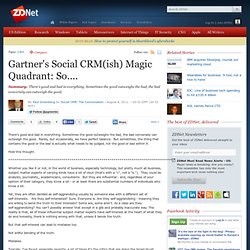
Sometimes the good outweighs the bad, the bad conversely can outweigh the good. Rarely, but occasionally, we have perfect balance. But sometimes, the thing that contains the good or the bad is actually what needs to be judged, not the good or bad within it. Hold this thought. Whether you like it or not, in the world of business, especially technology, but pretty much all business, subject matter experts of varying kinds have a lot of clout (that's with a "c", not a "k. "). Yet, they are often derided as self-aggrandizing usually by someone else with a different set of self-interests. But that self-interest can lead to mistakes too. Not willful bending of the truth. Mistakes. Typically, I've found, especially recently, a lot of times it's the critics that are doing the broad brush stroke tarring ("oh, it's the consultants who are like that" or "analysts are stupid f---wits", etc.) that are the self-aggrandizing ones.
Hold this thought Don't kid yourself. 1. Observations why Social CRM isn’t…. No, I won’t claim Social CRM is dead, to the contrary.
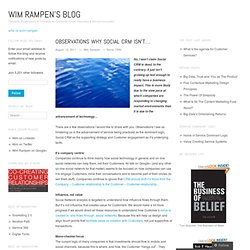
It just isn’t growing up fast enough to really have a business impact. This is more likely due to the slow pace at which companies are responding to changing market environments than it is due to the advancement of technology… There are a few observations I would like to share with you. Observations I see as hindering us in the advancement of service being practiced as the dominant logic, Social CRM as the supporting strategy and Customer engagement as it’s underlying tactic. Some Food For Thought On Social CRM (SCRM) — WhatWorksWhere.com. Leverage Social Behavior in Your B2B Email Campaigns.
Mike Hotz | April 18, 2012 | 0 Comments inShare52 Companies need to focus on growing engagement with their fan base, not just collecting more fans.
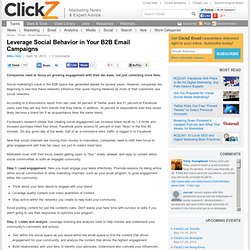
Social marketing's value in the B2B space has generated debate for several years. However, companies are beginning to see how these networks influence their users' buying behavior as more of their customers use social networks. According to a Kissmetrics report from last year, 64 percent of Twitter users and 51 percent of Facebook users said they will buy from brands that they follow. Facebook's research shows that creating social engagement can increase brand recall by 1.6 times and increase purchase intent four times. Social Media Is Not Social CRM, but It Can Be With These Five Steps. You've likely heard the following: "We need more followers on Twitter," or, possibly, "Our CEO wants more Likes on Facebook.
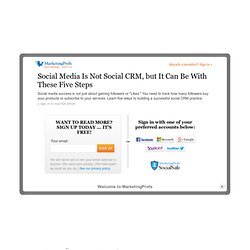
" What's a marketer to do? Our challenge is to educate not only ourselves but also those around us. The Value of Social Loyalty With most brands just trying to work out how to best use social media, it’s interesting to look at the flip side where social loyalty is now the big focus of the airline industry (look at all the great KLM work), where social loyalty plays will no doubt transform traditional style frequent flyer programs faster than anything we’ll see over the next few years… This infographic looks at the future of social loyalty for the airline industry.
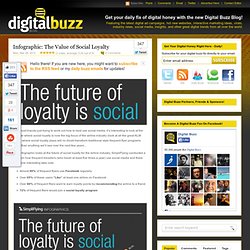
Why Your Company Needs to Embrace Social CRM. Maria Ogneva is the Director of Social Media at Attensity, a social media engagement and voice-of-customer platform that helps the social enterprise serve and collaborate with the social customer.

You can follow her on Twitter at @themaria or @attensity360, or find her musings on her personal blog and her company's blog. If you have been tracking conversations around social media for business, you have undoubtedly come across people talking about Social CRM. If you are anything like me, the first time you heard it, you probably rolled your eyes and said, “Ugh, another social media buzzword!” And while I do take issue with the jargon itself (and will discuss that later), Social CRM is a central concept that businesses need to understand deeply and integrate fully, in order to serve the social customer. Who Is the Social Customer? Bottom line: The social customer owns the relationship, and you need to earn her trust. What Is Social CRM?
You keep hearing about this social customer relationship management (CRM) thing, right?
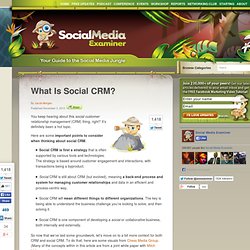
It’s definitely been a hot topic. Here are some important points to consider when thinking about social CRM. Social CRM is first a strategy that is often supported by various tools and technologies. The strategy is based around customer engagement and interactions, with transactions being a byproduct.Social CRM is still about CRM (but evolved), meaning a back-end process and system for managing customer relationships and data in an efficient and process-centric way.Social CRM will mean different things to different organizations. The key is being able to understand the business challenge you’re looking to solve, and then solving it.Social CRM is one component of developing a social or collaborative business, both internally and externally.